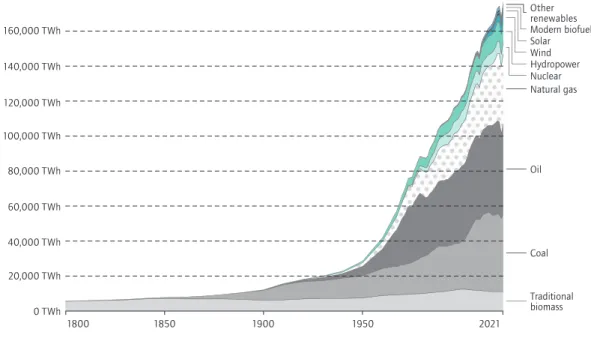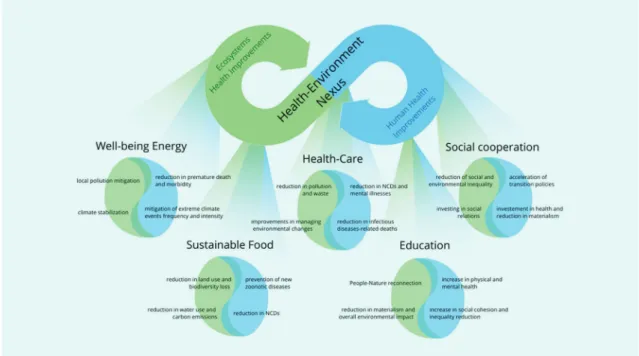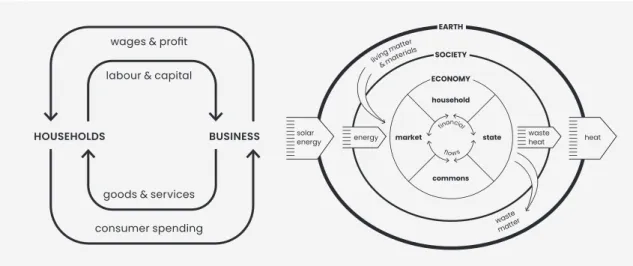The pursuit of ever more undifferentiated GDP growth will therefore not deliver for working people in terms of well-being and social progress. Therefore, trade unions must strengthen their cooperation with the growing group of actors who are calling for a move towards growth and a focus on well-being. Public services are key in this, as their collective nature minimizes ecological impacts while improving the well-being of more people.
Finally, a focus on public services of universal quality has the added benefit of making economies less dependent on economic growth to ensure well-being.
Introduction
Public services and the so-called foundational economy (Foundational Economy 2020) are key to ensuring people's well-being. In the past, trade unions played an important role in securing improvements in people's welfare. By highlighting the benefits of high-quality public services as a response to a world without growth, unions can work towards a sustainable improvement in the quality of life for workers, compatible with reducing environmental impacts.
This is followed by a section highlighting the importance of public services in a post-growth economy, focusing on its fundamental and transformative nature.
Ecological challenges and an end to growth
Moreover, even the scant findings on absolute decoupling of economic growth and emissions show that this is insufficient to reduce the ecological impact to the level needed to limit global warming to 1.5°C or even 2 °C. Thus, to return to a level of ecological effects consistent with biophysical limits, a global, permanent and sufficiently absolute decoupling is required. Technological fixes or efficiency improvements regularly make products less expensive, enabling higher consumption, leading to the same end result in terms of ecological impact.
When we look holistically at our ecological crises, the evidence is stacked against technological solutions that decouple economic activities from ecological impacts (Parrique et al.
A well-being economy beyond growth
Instead, a dashboard approach involving different indicators would be more appropriate to track different elements of well-being and human flourishing. Public services are critical to the well-being and prosperity of communities, but are typically undervalued relative to GDP. For example, the value of life or the value of a good education cannot—and should not—be quantified, but it is clearly critical to human well-being.
Third, GDP per capita accounts for average incomes and thus misses important differences in well-being caused by inequality. Ignoring the differential impacts of growth, and thus of environmental factors from climate change to air pollution, hides a key factor in well-being. While discussions about growth remain a niche issue, in recent years there has been an increase in discussions about moving beyond growth, with countries such as Scotland, Wales, New Zealand and Finland working together to build welfare economies through government partnerships. of welfare economics. Hough-Stewart and Meynen 2022).
Recently, mainstream environmental non-governmental organizations (ENGOs) such as the WWF and the European Environment Bureau (EEB), representing 180 ENGOs in 38 European countries, presented a briefing paper entitled 'This is the moment to go beyond GDP go. ' with the Wellbeing Economics Alliance (EEB et al. 2022). Since a focus on reducing emissions and resource use entails a reduction in the amount of work and vice versa (Frey 2019), a corresponding issue is the redistribution of the remaining work to avoid unemployment. Thus, an out-of-growth approach that focuses on well-being within sustainable limits will require working time reduction (WTR) for both social and ecological reasons.
Individual WTR to offset job losses by redistributing work will allow for increased well-being and end dependence on growth. On the other hand, at a societal level, WTR can also provide an imperative to reduce socially unproductive work, thus driving a shift towards meaningful work that is strongly conducive to well-being (Graeber 2018).

The central role of public services in a post-growth economy
The public provision of services can also reduce the labor consumption cycle (Schor 1992), where people are stuck in high workload jobs to pay for basic services such as mobility or health care that they need to be able to work in those jobs. Furthermore, public services can play a key role in enabling a smooth transition away from fossil fuels and ecologically destructive practices. Without this last pillar, of which public services are a central part, there can be no truly just transition.
This will require public services to be as efficient as possible to increase welfare without further growth. Fortunately, investment in public services can lead to a positive spiral of welfare improvements that can then pay for further improvements, eliminating the need for further growth and making the economy less dependent on growth. However, reliance on public provision of universal basic services does not necessarily mean a return to single national energy providers.
This will enable the testing of different ways to decarbonise the energy system and help increase democratic control of the public provision of universal basic services. The increased need for public services could also allow a slow shift of workers from shrinking sectors to growing and improved public services. This will be especially true if the quality of public services is improved by reducing the working hours of public sector employees, which for example will allow carers and nurses to live better lives and thus be less exhausted at work, as seen in the experiment Svartedalen (De Spiegelaere and Piasna.
Such a strengthening of public services can be accompanied by a job guarantee, for example through a public work program (Hickel 2020: 223). However, these posts must be of sufficient quality and must not undermine the value of existing posts.

Recommendations for moving beyond growth
Therefore, actors who bridge these worlds, such as the movement Trade Unions for Energy Democracy (Sweeney and Treat 2018), which confirmed the need to question green growth (Clarke and Lipsig-Mummé XR trade unionists4 or the German initiative Gewerkschafterinnen und Gewerkschafter für Klimaschutz ( Hartmann 2018 )5 can play a key role in moving the ball. In this way, unions could counter neoliberal individualization and return to working-class awareness through collective action (Brand and Niedermoser 2017: 167). If what will have to happen at the societal level, unions can oppose neoliberal narratives and point to the potential of democratic socio-ecological transformation, WTR and UBS.
This is consistent with Switalski's (2014: 8) claim that “[fairness will be the organizing value in post-growth Europe] and with Barry's observation that trade unions could replace economic growth with economic security. Similarly, unions may subscribe to a narrative that links sufficiency with security, as stable livelihoods are a key goal of unions (Keil and Kreinin 2022: 16). While it is a difficult task for trade unions to undertake to communicate that Europe has lived beyond its means without being seen as advocating austerity, there is a societal need to confront the illusion of perpetual growth.
Trade unions should thus strive to reduce their use of GDP and focus more on the use of indicators around welfare and inequality (Parrique. Trade unions need not advocate for GDP growth or support the need for growth to support their key objectives Finally, trade unions should participate in the discussion on choosing and mainstreaming key indicators of well-being, so that comparability and public recognition can be enhanced (Hough-Stewart and Meynen 2022).
By using the opportunities in the discourse, such as that surrounding the European Green Deal, trade unions can thus put forward positive alternatives that counter capital's plans (Thomas and Doerflinger 2020: 394). Similarly, unions should adopt the original meaning of just transition as applying to workers and not allow fossil capital to reinterpret it as requiring subsidies for capital instead (Spash 2020d).
Conclusion
Making Wellbeing Resilient: Creating Sustainable and Sustainable Wellbeing Systems in Times of Declining Economic Growth, Transformation Policy Brief #2, ZOE-Institute for Future Fit Economies. https://zoe-institut.de/en/publication/making-welfare-resilient-2/. 2019). A policy conference for trade unions, PSI. https://publicservices.international/resources/publications/universal-quality-public-services-union-policy-brief?id=11752&lang=en. www.demos.org/research/beyond-gdp-new-measures-new-economy. 2017). Why and how to reduce working time, ETUI. https://www.etui.org/publications/guides/the-why-and-how-of-working-time-reduction. 2017).
This is the time to go beyond GDP. https://eeb.org/library/this-is-the-moment-to-go-beyond-gdp-briefing/. 2022). Gerhardt A., Spittel A., Saeed S., Steiger D., Trunkwalter S. 2017) Trends – anticipating the impact of changes in transport on employment, working conditions, occupations and skills, ETF. https://www.etf-europe.org/resource/trends-global-changes-shaping-the-future-of-our-industry/. A mixed methods study on reducing working hours in Austria, ecological economics. For better working conditions and climate protection]. https://www.gpa.at/themen/arbeitszeit/anspruch-auf-4-tage-woche-sicherstellen.
Framework for Analysis and Empirical Evidence, Ecological Economics https://www.freitag.de/autoren/der- freitag/verdi-rettet-die-welt. But what should replace it?, openDemocracy. https://www.opendemocracy.net/en/oureconomy/gdp-metrics-new-zealand-beyond-economic-growth/. 2001). Five Pathways to Health and Environmental Policy in the Well-Being Economy, Association for a Well-Being Economy. https://well-beingeconomy.org/five-pathways-wards-health-environment-policy-in-a-well-being-economy. 2022) Toward health-environment policy: beyond the Rome Declaration, Global Environmental Change Canada's silent bargain: The benefits of public spending, Growing Gap Canadian Center for policy alternatives. https://cupe.ca/study-highlights-value-public-services. 1867).
Breaking the growth and jobs rut: a new policy agenda for post-coronavirus Europe, European Environment Bureau and European Youth Forum. https://eeb.org/wp-content/uploads/2020/11/EEB-REPORT-JOBTREADMILL.pdf. 2017). Public luxury for all or private luxury for a few: that's the choice we face, The Guardian. https://www.theguardian.com/commentisfree/2017/may/31/private-wealth-labour-common-space. https://www.youtube.com/watch?v=KWRRPed4Ds0. 2022). The hidden world beneath our feet is fascinating – and key to our planet's future, The Guardian. https://www.theguardian.com/environment/2022/. may/07/secret-world-under-our-mind-blowing-key-to-planets-future.
The gender dimensions of the climate crisis and the European Green Deal, EPSU. https://www.epsu.org/sites/default/files/article/files/EPSU%20Paper%20 Climate%20Gender%20European%20Green%20Deal.pdf. 2017).
